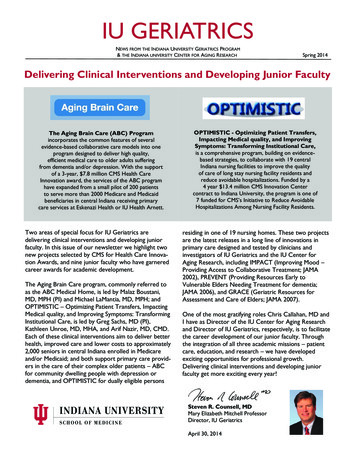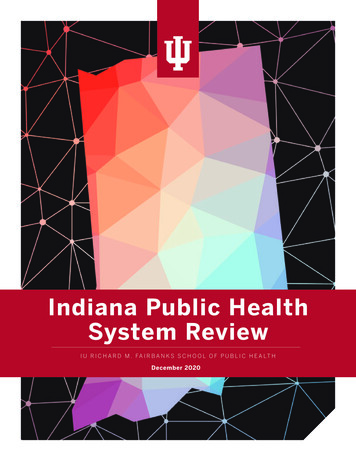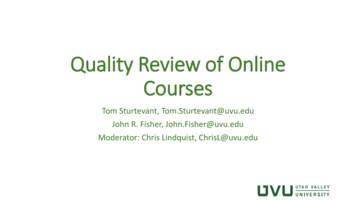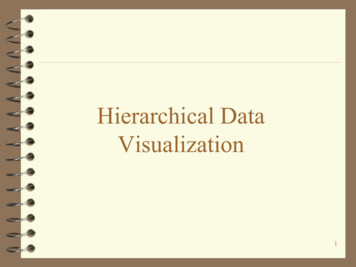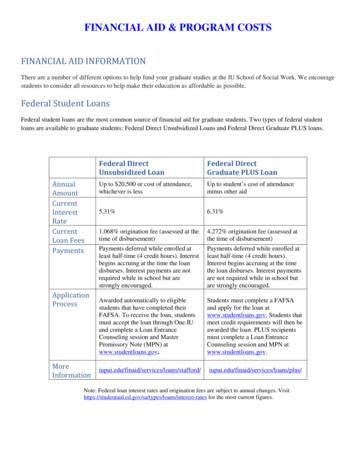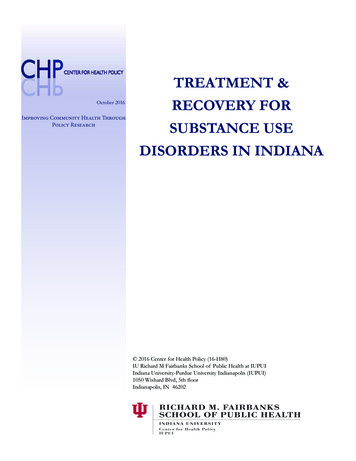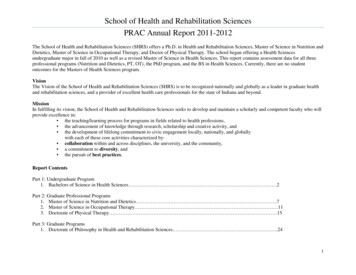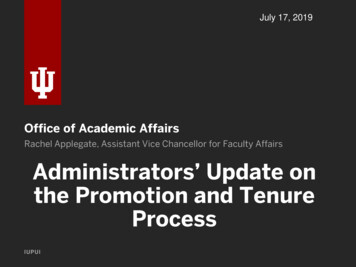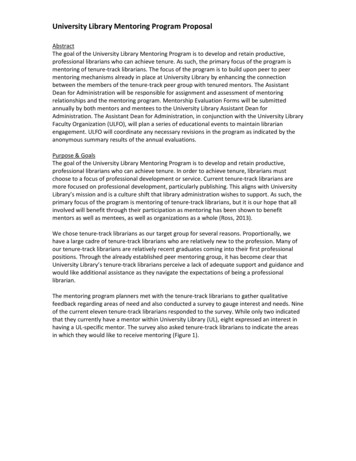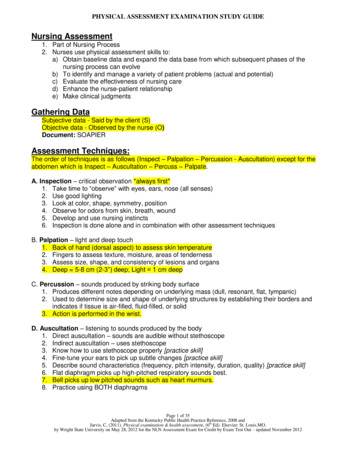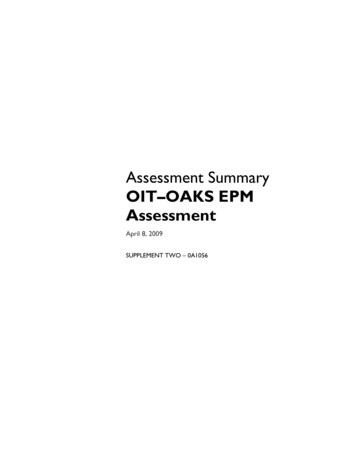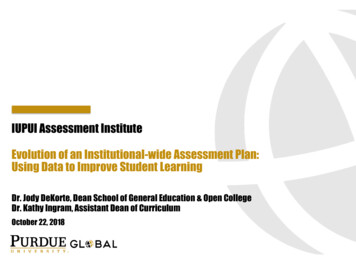
Transcription
IUPUI Assessment InstituteEvolution of an Institutional-wide Assessment Plan:Using Data to Improve Student LearningDr. Jody DeKorte, Dean School of General Education & Open CollegeDr. Kathy Ingram, Assistant Dean of CurriculumOctober 22, 2018
Purdue University GlobalMISSIONPurdue University Global deliverspersonalized online education tailoredto the unique needs of adults whohave work or life experience beyondthe classroom, enabling them todevelop essential academic andprofessional skills with the support andflexibility they need to achieve theircareer goals.Source: -philosophy.pdf
Purdue University GlobalOVERVIEW Programs/ Degrees Associates Bachelors Masters Doctoral Students Average age mid-30’s High percentage are female They work full time Family responsibilitiesSource: -philosophy.pdfIUPUI Assessment Institute Evolution of an Institution-wide Assessment Plan
PG Assessment Program
Guiding Questions for Program Development How do we determine what to assess?How do we incorporate new outcomes across the curriculum?How do you create culture that values well-written assessment?How do we keep outcomes current and valid?How do you ensure that assessments are valid?How do you design discipline specific assessments?How do we help faculty: understand the assessments? apply the criteria consistently (inter-rater reliability)? support students: provide timely feedback? How well do students understand the various assessments andreports?IUPUI Assessment Institute Evolution of an Institution-wide Assessment Plan #
Integration of GELs & PCs acrossstudent programs Faculty driven outcomes Continuous professionaldevelopment in multiple formats Student information documents Business and Industry support #
How did we determine what to assess?
Three Types of Outcomes Course Outcomes: Course outcomes are discipline- and content-specific learningoutcomes. General Education Literacies (GEL): General Education Literacies expose students to 10areas of general education throughout their program of study: Arts and Humanities,Communications, Critical Thinking, Ethics, Mathematics, Professionalism and CareerDevelopment, Research and Information, Science, Social Science, and Technology. Professional Competencies (PC): In the undergraduate programs, the Communications,Problem-Solving, and Critical-Thinking aspects of the Professional Competencies are taughtwithin the General Education Literacies. The additional aspects of Teamwork, Leadership,Personal Presentation, and Multiculturalism and Diversity round out the body ofProfessional Competencies. At the graduate level, all six Professional Competencies areembedded throughout program coursework.IUPUI Assessment Institute Evolution of an Institution-wide Assessment Plan #
How do we incorporate outcomesacross the curriculum?
PG CLA Program EvolutionIUPUI Assessment Institute Evolution of an Institution-wide Assessment Plan #
Note: GELs are in all undergraduate core and elective courses. PCs are in core undergraduateand graduate coursesIUPUI Assessment Institute Evolution of an Institution-wide Assessment Plan #
How did we create a culture thatvalues well-written assessments?
Systematic, Systemic, and Collaborative Faculty GEL/PC committeesCollaboration across PG Centralized Curriculum & Innovation team Assessment and Research Team support throughdata collection and analysis University Assessment Committee support for projectIUPUI Assessment Institute Evolution of an Institution-wide Assessment Plan #
Faculty-Driven Each program is divided into a series of courses whichprepare students for employment in the field byproviding preparation, practice, and opportunities toshow mastery of the program outcomes. Faculty members assess student mastery of eachcourse outcome through Course Learning Assessments(CLA), which are mapped to program outcomes. GELs and PCs are also assessed which allow students,faculty, and programs administrators to see how thestudent progresses throughout their entire program. Each GEL and PC area has a committee comprising offaculty and academic staff who are subject matterexperts from across the university, for writingoutcomes, developing rubrics, and reviewing andapproving the manner in which the outcomes aretaught in each course.IUPUI Assessment Institute Evolution of an Institution-wide Assessment PlanNo t4Mastery5Standard Rubric Scale #
How do we keep our outcomescurrent & valid?
Course Level Outcomes #
Business Program OutcomesIUPUI Assessment Institute Evolution of an Institution-wide Assessment Plan #
Programmatic Outcome AlignmentIUPUI Assessment Institute Evolution of an Institution-wide Assessment Plan #
Systematic Curriculum Processes Systematic &SystemicProgram MappingCourse Mapping OutcomesProgramCourseUnit Outcome drivenUniversitystandardsAdult learnersReview of DataMaster listStudent feedbackFaculty feedbackCourse LeadmeetingsData-drivenIUPUI Assessment Institute Evolution of an Institution-wide Assessment Plan #
How do we ensure thatassessments are valid?
Systemic and CollaborativeAcademic Leadership,Faculty, CL/ SME,ADoC, and CSFaculty SME/CL and CSFaculty SME/ CL, C&ITeamChair, Faculty,ADoC, and CSC&I TeamPurdue University Global This is Where the Title of the Presentation Will Go #
Course-Level Assessment: Collaborative Design ProcessCourse MapOutcomesRubricsBloom’s Taxonomy of Cognitive Skills, From Rothwell & Kazansas (1998)Assessment22
How do we design disciplinespecific assessments?
Possible AssessmentsSummative EvaluationTest- case study Qs; authenticQuiz- sameDiscussion Board-authentic Qs; casestudies; web questsProjects/Papers/PortfoliosReflective PapersPresentations- Ind., GroupTest- LO QsQuiz- sameLOLearningOutcomes State ListSurvey- Muddiest ptPre-quiz- Did they read?HomeworkHOLearningQuiz- Applied Qs; ReviewOutcomesDiscussion Board- Review, Summary; ApplyGroup-work DesignReflective Journals CreateCase Studies SolveFormative Assessment
Programmatic Assessments erIUPUI Assessment Institute Evolution of an Institution-wide Assessment Plan #
How do we help faculty?
Professional Development New Faculty Orientation Course Lead Training GEL and PC Committee Workshops Departmental Meetings Course Lead Quarterly Meetings Departmental Norming Sessions Office of Assessment & Assessment Committee SupportIUPUI Assessment Institute Evolution of an Institution-wide Assessment Plan #
How do we help both faculty andstudents understand?
Metrics for Continuous Improvement #
Next Up IUPUI Assessment Institute Evolution of an Institution-wide Assessment Plan
What are some of the promisingpractices that you have at yourinstitution today?What would you like toincorporate from some of today’sideas?IUPUI Assessment Institute Evolution of an Institution-wide Assessment Plan #
ReferencesAngelo, T. A. & Cross, K. P. (1993). Classroom assessment techniques: A handbook for college teachers (2nd ed.).The Association of American Colleges and Universities. (2013, April 10). It takes more than a major: Employer prioritiesfor college learning and student success. Retrieved LEAP/2013 EmployerSurvey.pdfBanta, T. W., Lund. J. P., Black, K. E, & Oblander, F. W. (1996). Assessment in practice: Putting principles to work oncollege campuses.Crisp, G.T. (2012). Integrative assessment: Reframing assessment practice for current and future learning. Assessment& Evaluation in Higher Education, 37(1), pp. 33-43.Forbes. (2017). America’s best employers for 2015. Retrieved from http://www.forbes.com/companies/kaplan/.Hanusek, E. A., Woessumann, L., & Zhang, L. (2011). General Education, Vocational Education, and Labor-marketOutcomes over the Life-cycle. Retrieved /689824106.pdfHart Research Associates. (2013, April 10). It takes more than a major: Employer priorities for college learning andstudent success. Retrieved from /2013 EmployerSurvey.pdfKaplan University. (2016). Academic Report, The Year in Review, 2015-2016.Mertler, C. A. (2003). Classroom assessment: A practical guide for educators.Oosterhof, A. (2001). Classroom applications of educational measurement (3rd ed).Suskie, L. (2004). Assessing student learning: A common sense guide.Waugh, K.C. & Gronlund, N. E. (2013) Assessment of student achievement (10th ed.)The Wall Street Journal. (2016, August 30). The ‘soft skills’ employers are looking for. [Web log post]. Retrieved soft-skills-employers-are-looking-for/Zumbrunn, S. & Krause, K. (2012). Conversations with leaders: Principles of effective writing instruction. The ReadingTeacher, 65(5), 346-353. .
Dr. Jody DeKorte, Dean School of General Education & Open College Dr. Kathy Ingram, Assistant Dean of Curriculum October 22, 2018 . MISSION Purdue University Global delivers . Kaplan University. (2016). Academic Report, The Year in Review, 2015-2016. Mertler, C. A. (2003
